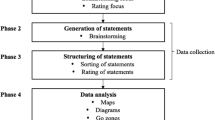Abstract
The commercialisation of education and the massive recruitment of international students across different vocational education and training (VET) systems including the US, UK, Canada and Australia have led to significant changes in the VET teaching and learning landscape. This situation compels the VET sector to design and develop new professional development programs to support the immediate and changing needs of teachers working with the diverse international student cohort. However, to date, teacher professional development in response to the growing population of international students has not been an explicit focus of empirical study and theoretical conceptualisation in VET research. This study responds to this paucity. It draws on a broader three-year research project funded by the Australian Research Council (2014–2017) that involves fieldwork, participation in and observation of staff professional development activities and interviews with 102 VET staff in Australia. It uses positioning theory as a conceptual framework to examine how VET teachers position themselves and their professional development needs in response to international students. The results call for a critical need to re-examine the focus of the current professional development programs offered for VET teachers. The current context requires teacher professional development in international VET to focus on developing teachers’ capabilities to re-examine their pedagogical beliefs and practices and to understand international students’ various needs and cultural backgrounds. The study also stresses the importance of ongoing professional learning to equip teachers with the skills and knowledge to appropriate their pedagogical practices in response to the critical need to prepare all students for the intercultural labour market and to use students’ diversity as a resource for teaching and learning.
Similar content being viewed by others
Notes
Its name has been changed to Australian Workforce and Productivity Agency
References
AEI. (2017). Research snapshot: The global context of tertiary student mobility. Retrieved from, https://internationaleducation.gov.au/research/Research-Snapshots/Documents/Global%20context%20of%20tertiary%20student%20mobility.pdf.
Aitken, J. (2012). A case study exploring the experiences of teachers in developing confidence in their teaching skills and the role that continuing professional development has played in the acquisition of this confidence: What has worked for them and why? AVETRA Conference Proceeding.
Anderson, D. (2005). Measuring the impact and outcomes of market reform in VET. In K. Ball (Ed.), Findings and financing Vocational Education and Training: Research readings (pp. 24–28). Adelaide: NCVER.
Skills Australia. (2010). Australian workforce futures: A national workforce development strategy. Canberra: Commonwealth of Australia.
Billett, S. (2010). Lifelong learning and self: Work, subjectivity and learning. Studies in Continuing Education, 32(1), 1–16.
Billett, S., Choy, S., & Smith, R. (2013). Evaluation of continuing professional development programs provided by the VET Development Centre. Australia: VET Development Centre.
Cao, L., & Tran, L. T. (2015). Pathways from vocational education and associate degree to higher education: Chinese students in Australia. Asia Pacific Journal of Education., 35(2), 274–289.
Clayton, B. (2009). Viewing RTOs Through the lens of culture. In R. Brennan (Ed.), AVETRA 12th Annual conference: Aligning participants, Policy and Pedagogy: Traction and Tensions in VET Research (pp. 1–14). Crows Nest: Australian Vocational Education and Training Research Association.
Davies, B., & Harré, R. (1990). Positioning: The discursive production of selves. Journal for the Theory of Social Behaviour, 20(1), 43–63.
Elliott, R. (2014). Faculty development curriculum: What informs it? The Journal of Faculty Development, 28(3), 35–46.
Gergen, K. (1999). An invitation to social construction. Thousand Oaks: Sage.
Guthrie, H. (2010). Professional development in the vocational education and training workforce. Occasional Paper. Adelaide: ERIC.
Guthrie, H., & Clayton, B. (2012) An association for VET's professionals: what's the story? In AVETRA 15th Annual Conference. Crows Nest: Australian Vocational Education and Training Research Association.
Harré, R., & van Langenhove, L. (1991). Varieties of positioning. Journal for the Theory of Social Behaviour, 21, 393–408.
Harré, R., & van Langenhove, L. (1999). Positioning theory: Moral contexts of intentional actions. Oxford: Blackwell.
Hattie, J. (2012). Visible learning for teachers: Maximizing impact on learning. Abingdon: Routledge.
Hawke, G. (2008). Making decisions about workforce development in registered training organisations. Adelaide: ERIC.
ICEF Monitor (2017). Australian education exports approaching AUS$29 billion. Retrieved from, http://monitor.icef.com/2017/10/australian-education-exports-approaching-aus29-billion/. Accessed 25 October 2007.
Loveder, P. (2005). World trends in staff development: Implications on the performance of technical education institutions. Adelaide: NCVER.
Nakar, S. (2013). Understanding VET teachers' challenges in providing quality education to international students. International Journal of Training Research, 11(1), 79–88.
Pasura, R. (2014). Neoliberal economic markets in vocational education and training: Shifts in perceptions and practices in private vocational education and training in Melbourne, Australia. Globalisation, Societies and Education, 12(4), 564–582.
Pasura, R. (2015). International students in the private VET sector in Melbourne, Australia: Rethinking their characteristics and aspirations outside the deficit model. Journal of Vocational Education & Training, 67(2), 203–218.
Pham, L., & Tran, L. T. (2015). Understanding the symbolic capital of intercultural interactions: A case study of international students in Australia. International Studies in Sociology of Education, 25(3), 204–224.
Sanderson, G. (2011). Internationalisation and teaching in higher education. Higher Education Research and Development, 30(5), 661–676.
Singh, M. (2011). Learning from China to internationalise Australian research education: Pedagogies of intellectual equality and ‘optimal ignorance’ of ERA journal rankings. Innovations in Education and Teaching International, 48, 355–365.
Smith, E. (2010). Pedagogy and not political point scoring: How training providers teach international students. In Paper presented at the 13th AVETRA annual conference. Surfers: Paradise, Queensland.
Smith, E., & Grace, L. (2011). Vocational educators' qualifications: A pedagogical poor relation? International Journal of Training Research, 9(3), 204–217.
Smith, E., & Keating, J. (2003). From training reform to training packages. Tuggerah: NSW Social Science Press.
Thomas, G. (2013). How to do your research project: A guide for students in education and applied social sciences. London: Sage.
Tran, L. T. (2013a). Teaching international students in vocational education: New pedagogical approaches. Melbourne: ACER Press.
Tran, L. T. (2013b). Internationalisation of vocational education and training: An adapting curve for teachers and learners. Journal of Studies in International Education, 17(4), 492–507.
Tran, L., & Dempsey, K. (2017). Internationalization in VET: An overview. In L. T. Tran & K. Dempsey (Eds.), Internationalization in Vocational Education and Training: Transnational Perspectives (pp. 1–15). Dordrecht: Springer.
Tran, L. T., & Le, T. (2017). Teacher professional development under the impact of internationalization in VET. In L. T. Tran & K. Dempsey (Eds.), Internationalization in vocational education and training: Transnational perspectives (pp. 68–84). Dordrecht: Springer.
Tran, L. T., & Nguyen, N. (2015). Re-imagining teachers’ professional roles and identity under the condition of internationalisation. Teachers and Teaching: Theory and Practice, 21(8), 958–973.
Tran, L., & Nyland, C. (2013). Competency-based training, global skills mobility and the teaching of international students in vocational education and training. Journal of Vocational Education and Training, 65(1), 143–157.
Wheelahan, L. (2008). Can learning outcomes be divorced from processes of learning? Or why training packages make a very bad curriculum. Paper presented at the 11th AVETRA Annual Conference, Adelaide.
Wheelahan, L., & Curtin, E. (2010). The quality of teaching in VET: An overview. Melbourne: Unpublished paper, LH Martin Institute.
Wheelahan, L., & Moodie, G. (2011). The quality of teaching in VET: Final report and recommendations. Melbourne: Australian College of Educators.
Acknowledgements
We are grateful to the anonymous Reviewers for their critical comments which help us considerably improve this article. We acknowledge with thanks the valuable contributions from the teacher participants and the funding from the Australian Research Council for this project. This paper is based on the data from a research project (DE140101473) funded by the Australian Research Council.
Author information
Authors and Affiliations
Corresponding author
Rights and permissions
About this article
Cite this article
Tran, L.T., Pasura, R. Professional Development for Teachers Working with International Students. Vocations and Learning 11, 345–364 (2018). https://doi.org/10.1007/s12186-017-9195-6
Received:
Accepted:
Published:
Issue Date:
DOI: https://doi.org/10.1007/s12186-017-9195-6




